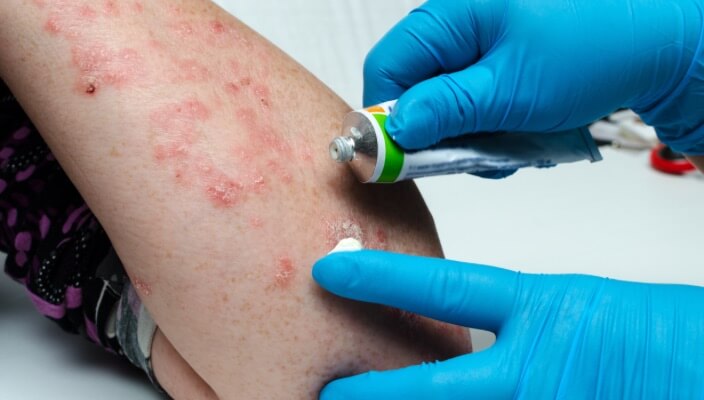Dealing with Melasma: Causes, Prevention, and Treatment Options for Pregnant Women
Treatments for Melasma in Pregnancy
 Melasma is a skin condition that occurs during pregnancy, aptly nicknamed the 'pregnancy mask.' During pregnancy, women experience unpredictable fluctuations of hormones and, in many cases, drastic increases in the production of both progesterone and estrogen. As hormones begin to increase throughout the body, the overproduction of melanin may occur. As a result, it's not uncommon for pregnant women to experience hyperpigmentation or the darkening of the skin on the face, also known as Melasma.
Melasma is a skin condition that occurs during pregnancy, aptly nicknamed the 'pregnancy mask.' During pregnancy, women experience unpredictable fluctuations of hormones and, in many cases, drastic increases in the production of both progesterone and estrogen. As hormones begin to increase throughout the body, the overproduction of melanin may occur. As a result, it's not uncommon for pregnant women to experience hyperpigmentation or the darkening of the skin on the face, also known as Melasma.
Causes and Genetic Factors Linked to Melasma
Estrogen and Progesterone Increases
In most cases, major hormonal changes in the body are often found to be the trigger behind the development of melasma in pregnant women. As estrogen and progesterone hormones increase significantly, melanin may also be overproduced, resulting in hyperpigmentation of the skin.
Genetics
In some instances, people with a family history of melasma may be more susceptible to developing it. This is likely due to similar hormonal cycles and the overstimulation of melanin you may experience throughout pregnancy.
Skin Type
Those who have naturally darker skin are more likely to experience melasma. This is often due to higher melanin levels in the body itself, even prior to pregnancy.
Sun Exposure
Unfortunately, overexposure to the sun may contribute to the development of melasma, especially in pregnant women with a family history involving skin conditions. Proper UV protection, sunscreen, clothing, and hats can prevent overexposure to the sun during your pregnancy while mitigating the severeness of the pigmentation you're experiencing.
Signs and Symptoms of Melasma
Preventing Melasma
- Protect yourself anytime you are outdoors or exposed to the sun. UV gear, clothing, accessories, and sunscreen can come in handy, especially while pregnant or attempting to get pregnant.
- Eat a healthy diet that is low in refined sugars and carbohydrates, as these can worsen inflammation and exacerbate skin conditions.
- Manage your hormones in-depth by visiting an endocrinologist or an OBGYN who specializes in hormonal management.
Melasma Treatment Options for Pregnant Women
Although melasma is not harmful or dangerous to the body or the baby of a pregnant woman, you may find it unsightly or uncomfortable due to scarring, irregular pigmentation, or dryness that has become increasingly prevalent on your face. Treating melasma is not recommended during pregnancy but can be addressed once you are postpartum.
Currently, there are multiple treatment options that may reduce the visibility of scarring, unwanted pigmentation spots, and even dryness that has spread from the condition. The following treatment options are common for pregnant women who have been diagnosed with melasma:
Pigmentation Correction: Pigmentation correction solutions can help pinpoint specific areas of the face that require more attention while also addressing age spots, sunspots, and uneven pigmentation.
Chemical Peels: Chemical peels typically utilize glycolic acid to reduce unnecessary and unwanted pigmentation of the skin caused by melasma.
Laser Therapy: Laser therapy, along with IPL, or intense pulsed light therapy have been shown to help reduce the pigmentation of the skin using a seamless and painful solution.
Topical Solutions: In less severe cases, topical solutions can help with the rejuvenation of the skin and the reduction of unnecessary pigmentation of the skin. Topical solutions may include vitamin C serums in addition to the use of azelaic acid, which can be applied to improve tone while simultaneously reducing unwanted hyperpigmentation. Once you are postpartum, additional options, including retinoids and hydroquinone (skin-lightening solutions), may also be presented as a treatment option.
Understanding melasma is essential if you're currently pregnant, plan to get pregnant, or if you have a family history of melasma or other pregnancy-related skin conditions. If you've recently discovered that your skin's pigment is becoming uneven or more prominent, especially on your face, turning to The Skin Surgery Center can help you with the rejuvenation and treatment solutions you need. To learn more about melasma, prevention and mitigation tips, and treatment options, schedule an appointment with The Skin Surgery Center today.
Featured Products for Melasma
Check your local office for current stock!
Check your local office for current stock!
Featured Blogs

- General Dermatology
- Chronic Skin Conditions
Eczema, a chronic skin condition characterized by inflammation and intense itching, can be challenging to manage, especially during flare-ups.
Read More
- Chronic Skin Conditions
Rosacea, a chronic skin condition characterized by redness, visible blood vessels, and sometimes acne-like bumps, can be an enigmatic challenge for those who experience it.
Read More
- General Dermatology
- Skin Care
Learn how to protect yourself from poison ivy year-round with dermatologist tips on seasonal changes and rash prevention. Stay safe and rash-free!
Read More


